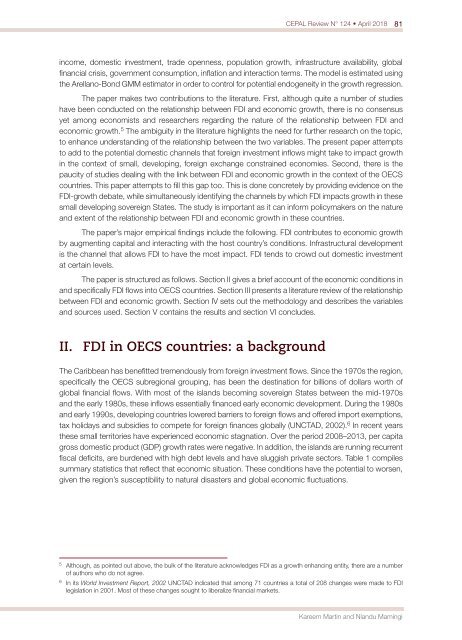CEPAL Review no. 124
April 2018
April 2018
Create successful ePaper yourself
Turn your PDF publications into a flip-book with our unique Google optimized e-Paper software.
<strong>CEPAL</strong> <strong>Review</strong> N° <strong>124</strong> • April 2018<br />
81<br />
income, domestic investment, trade openness, population growth, infrastructure availability, global<br />
financial crisis, government consumption, inflation and interaction terms. The model is estimated using<br />
the Arella<strong>no</strong>-Bond GMM estimator in order to control for potential endogeneity in the growth regression.<br />
The paper makes two contributions to the literature. First, although quite a number of studies<br />
have been conducted on the relationship between FDI and eco<strong>no</strong>mic growth, there is <strong>no</strong> consensus<br />
yet among eco<strong>no</strong>mists and researchers regarding the nature of the relationship between FDI and<br />
eco<strong>no</strong>mic growth. 5 The ambiguity in the literature highlights the need for further research on the topic,<br />
to enhance understanding of the relationship between the two variables. The present paper attempts<br />
to add to the potential domestic channels that foreign investment inflows might take to impact growth<br />
in the context of small, developing, foreign exchange constrained eco<strong>no</strong>mies. Second, there is the<br />
paucity of studies dealing with the link between FDI and eco<strong>no</strong>mic growth in the context of the OECS<br />
countries. This paper attempts to fill this gap too. This is done concretely by providing evidence on the<br />
FDI-growth debate, while simultaneously identifying the channels by which FDI impacts growth in these<br />
small developing sovereign States. The study is important as it can inform policymakers on the nature<br />
and extent of the relationship between FDI and eco<strong>no</strong>mic growth in these countries.<br />
The paper’s major empirical findings include the following. FDI contributes to eco<strong>no</strong>mic growth<br />
by augmenting capital and interacting with the host country’s conditions. Infrastructural development<br />
is the channel that allows FDI to have the most impact. FDI tends to crowd out domestic investment<br />
at certain levels.<br />
The paper is structured as follows. Section II gives a brief account of the eco<strong>no</strong>mic conditions in<br />
and specifically FDI flows into OECS countries. Section III presents a literature review of the relationship<br />
between FDI and eco<strong>no</strong>mic growth. Section IV sets out the methodology and describes the variables<br />
and sources used. Section V contains the results and section VI concludes.<br />
II. FDI in OECS countries: a background<br />
The Caribbean has benefitted tremendously from foreign investment flows. Since the 1970s the region,<br />
specifically the OECS subregional grouping, has been the destination for billions of dollars worth of<br />
global financial flows. With most of the islands becoming sovereign States between the mid-1970s<br />
and the early 1980s, these inflows essentially financed early eco<strong>no</strong>mic development. During the 1980s<br />
and early 1990s, developing countries lowered barriers to foreign flows and offered import exemptions,<br />
tax holidays and subsidies to compete for foreign finances globally (UNCTAD, 2002). 6 In recent years<br />
these small territories have experienced eco<strong>no</strong>mic stagnation. Over the period 2008–2013, per capita<br />
gross domestic product (GDP) growth rates were negative. In addition, the islands are running recurrent<br />
fiscal deficits, are burdened with high debt levels and have sluggish private sectors. Table 1 compiles<br />
summary statistics that reflect that eco<strong>no</strong>mic situation. These conditions have the potential to worsen,<br />
given the region’s susceptibility to natural disasters and global eco<strong>no</strong>mic fluctuations.<br />
5<br />
Although, as pointed out above, the bulk of the literature ack<strong>no</strong>wledges FDI as a growth enhancing entity, there are a number<br />
of authors who do <strong>no</strong>t agree.<br />
6<br />
In its World Investment Report, 2002 UNCTAD indicated that among 71 countries a total of 208 changes were made to FDI<br />
legislation in 2001. Most of these changes sought to liberalize financial markets.<br />
Kareem Martin and Nlandu Mamingi


















